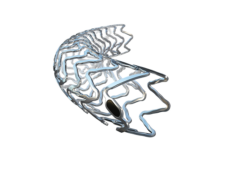 Biotronik has announced the launch of BIOMAG-LL, a pre-market trial focused on confirming the safety and clinical performance of Freesolve resorbable magnesium scaffold (RMS), for the treatment of long de novo lesions in native coronary arteries.
Biotronik has announced the launch of BIOMAG-LL, a pre-market trial focused on confirming the safety and clinical performance of Freesolve resorbable magnesium scaffold (RMS), for the treatment of long de novo lesions in native coronary arteries.
BIOMAG-LL is a prospective, international, multicentre, single arm premarket study that will enrol 100 patients in Europe with de novo coronary artery stenosis and long lesions. Given that the Freesolve RMS is already CE-certified for shorter lesions, the BIOMAG-LL study will evaluate its effectiveness in longer lesions with new device sizes including now 35 mm and 40 mm scaffold lengths to support a broader market release.
“We are pleased to introduce the BIOMAG-LL trial as a premarket study with a particular focus on treating longer coronary lesions,” says Flavio Ribichini (University Hospital Verona, Verona, Italy). “The exceptional results in target lesion failure rates and safety of the Freesolve scaffold in the previous BIOMAG-I- trials makes us confident in its potential for treating complex, long lesions.”
The first patient was successfully included in the trial at the study site at Pauls Stradins Clinical University Hospital (Riga, Latvia) by Inga Narbute.
The primary endpoint of the study is the target lesion failure (TLF) rate at 12 months. Patients will undergo clinical follow-up visits at one, six, and twelve months, as well as at three and five years after the procedure.
“With the BIOMAG-LL study, we’re expanding on the findings from the BIOMAG-I trial, exploring Freesolve’s potential to meet the treatment needs of patients with longer lesions in coronary arteries,” says Georg Nollert, vice president medical affairs, Vascular Intervention at Biotronik. “With this study we aim to prove the efficacy of longer length Freesolve resorbable magnesium scaffolds and bring this unique technology to a broader range of patients.”
The two-year follow-up data from the BIOMAG-I trial, announced in May 2024, confirm Freesolve RMS as an effective alternative to contemporary drug-eluting stents (DES), demonstrating consistently low rates of TLF and no findings in scaffold thrombosis so far. In parallel, Biotronik has launched the BIOMAG-II randomised controlled trial in May 2024, to compare the clinical outcomes of Freesolve RMS and DES.












